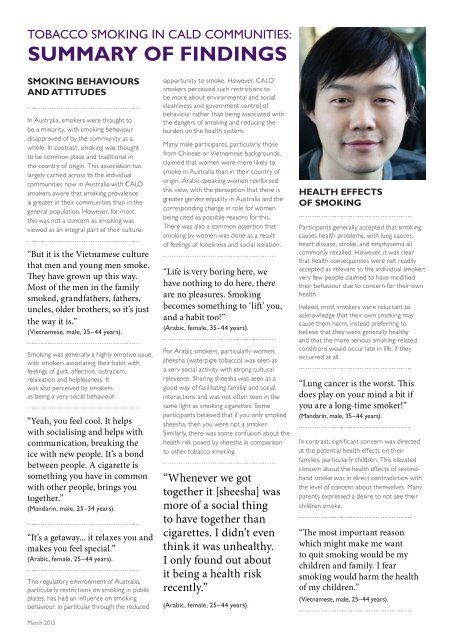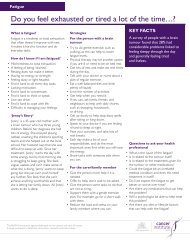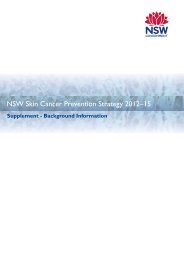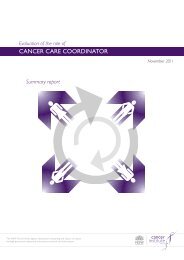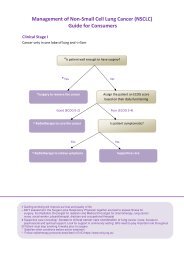tobacco smoking in arabic, chinese and vietnamese communities in ...
tobacco smoking in arabic, chinese and vietnamese communities in ...
tobacco smoking in arabic, chinese and vietnamese communities in ...
Create successful ePaper yourself
Turn your PDF publications into a flip-book with our unique Google optimized e-Paper software.
TOBACCO SMOKING IN CALD COMMUNITIES:<br />
SUMMARY OF FINDINGS<br />
SMOKING BEHAVIOURS<br />
AND ATTITUDES<br />
In Australia, smokers were thought to<br />
be a m<strong>in</strong>ority, with <strong>smok<strong>in</strong>g</strong> behaviour<br />
disapproved of by the community as a<br />
whole. In contrast, <strong>smok<strong>in</strong>g</strong> was thought<br />
to be common place <strong>and</strong> traditional <strong>in</strong><br />
the country of orig<strong>in</strong>. This association has<br />
largely carried across to the <strong>in</strong>dividual<br />
<strong>communities</strong> now <strong>in</strong> Australia with CALD<br />
smokers aware that <strong>smok<strong>in</strong>g</strong> prevalence<br />
is greater <strong>in</strong> their <strong>communities</strong> than <strong>in</strong> the<br />
general population. However, for most,<br />
this was not a concern as <strong>smok<strong>in</strong>g</strong> was<br />
viewed as an <strong>in</strong>tegral part of their culture.<br />
“But it is the Vietnamese culture<br />
that men <strong>and</strong> young men smoke.<br />
They have grown up this way.<br />
Most of the men <strong>in</strong> the family<br />
smoked, gr<strong>and</strong>fathers, fathers,<br />
uncles, older brothers, so it’s just<br />
the way it is.”<br />
(Vietnamese, male, 25–44 years).<br />
Smok<strong>in</strong>g was generally a highly emotive issue,<br />
with smokers associat<strong>in</strong>g their habit with<br />
feel<strong>in</strong>gs of guilt, affection, ostracism,<br />
relaxation <strong>and</strong> helplessness. It<br />
was also perceived by smokers<br />
as be<strong>in</strong>g a very social behaviour.<br />
“Yeah, you feel cool. It helps<br />
with socialis<strong>in</strong>g <strong>and</strong> helps with<br />
communication, break<strong>in</strong>g the<br />
ice with new people. It’s a bond<br />
between people. A cigarette is<br />
someth<strong>in</strong>g you have <strong>in</strong> common<br />
with other people, br<strong>in</strong>gs you<br />
together.”<br />
(M<strong>and</strong>ar<strong>in</strong>, male, 25–34 years).<br />
“It’s a getaway... it relaxes you <strong>and</strong><br />
makes you feel special.”<br />
(Arabic, female, 25–44 years).<br />
The regulatory environment of Australia,<br />
particularly restrictions on <strong>smok<strong>in</strong>g</strong> <strong>in</strong> public<br />
places, has had an <strong>in</strong>fluence on <strong>smok<strong>in</strong>g</strong><br />
behaviour, <strong>in</strong> particular through the reduced<br />
March 2013<br />
opportunity to smoke. However, CALD<br />
smokers perceived such restrictions to<br />
be more about environmental <strong>and</strong> social<br />
cleanl<strong>in</strong>ess <strong>and</strong> government control of<br />
behaviour rather than be<strong>in</strong>g associated with<br />
the dangers of <strong>smok<strong>in</strong>g</strong> <strong>and</strong> reduc<strong>in</strong>g the<br />
burden on the health system.<br />
Many male participants, particularly those<br />
from Ch<strong>in</strong>ese or Vietnamese backgrounds,<br />
claimed that women were more likely to<br />
smoke <strong>in</strong> Australia than <strong>in</strong> their country of<br />
orig<strong>in</strong>. Arabic-speak<strong>in</strong>g women re<strong>in</strong>forced<br />
this view, with the perception that there is<br />
greater gender equality <strong>in</strong> Australia <strong>and</strong> the<br />
correspond<strong>in</strong>g change <strong>in</strong> role for women<br />
be<strong>in</strong>g cited as possible reasons for this.<br />
There was also a common assertion that<br />
<strong>smok<strong>in</strong>g</strong> by women was done as a result<br />
of feel<strong>in</strong>gs of lonel<strong>in</strong>ess <strong>and</strong> social isolation.<br />
“Life is very bor<strong>in</strong>g here, we<br />
have noth<strong>in</strong>g to do here, there<br />
are no pleasures. Smok<strong>in</strong>g<br />
becomes someth<strong>in</strong>g to ‘lift’ you,<br />
<strong>and</strong> a habit too!”<br />
(Arabic, female, 35–44 years).<br />
For Arabic smokers, particularly women,<br />
sheesha (waterpipe <strong>tobacco</strong>) was seen as<br />
a very social activity with strong cultural<br />
relevance. Shar<strong>in</strong>g sheesha was seen as a<br />
good way of facilitat<strong>in</strong>g familial <strong>and</strong> social<br />
<strong>in</strong>teractions <strong>and</strong> was not often seen <strong>in</strong> the<br />
same light as <strong>smok<strong>in</strong>g</strong> cigarettes. Some<br />
participants believed that if you only smoked<br />
sheesha, then you were not a smoker.<br />
Similarly, there was some confusion about the<br />
health risk posed by sheesha <strong>in</strong> comparison<br />
to other <strong>tobacco</strong> <strong>smok<strong>in</strong>g</strong>.<br />
“Whenever we got<br />
together it [sheesha] was<br />
more of a social th<strong>in</strong>g<br />
to have together than<br />
cigarettes. I didn’t even<br />
th<strong>in</strong>k it was unhealthy.<br />
I only found out about<br />
it be<strong>in</strong>g a health risk<br />
recently.”<br />
(Arabic, female, 25–44 years).<br />
HEALTH EFFECTS<br />
OF SMOKING<br />
Participants generally accepted that <strong>smok<strong>in</strong>g</strong><br />
causes health problems, with lung cancer,<br />
heart disease, stroke, <strong>and</strong> emphysema all<br />
commonly recalled. However, it was clear<br />
that health consequences were not readily<br />
accepted as relevant to the <strong>in</strong>dividual smoker;<br />
very few people claimed to have modified<br />
their behaviour due to concern for their own<br />
health.<br />
Indeed, most smokers were reluctant to<br />
acknowledge that their own <strong>smok<strong>in</strong>g</strong> may<br />
cause them harm, <strong>in</strong>stead preferr<strong>in</strong>g to<br />
believe that they were generally healthy<br />
<strong>and</strong> that the more serious <strong>smok<strong>in</strong>g</strong>-related<br />
conditions would occur late <strong>in</strong> life, if they<br />
occurred at all.<br />
“Lung cancer is the worst. This<br />
does play on your m<strong>in</strong>d a bit if<br />
you are a long-time smoker!”<br />
(M<strong>and</strong>ar<strong>in</strong>, male, 35–44 years).<br />
In contrast, significant concern was directed<br />
at the potential health effects on their<br />
families, particularly children. This elevated<br />
concern about the health effects of secondh<strong>and</strong><br />
smoke was <strong>in</strong> direct contradiction with<br />
the level of concern about themselves. Many<br />
parents expressed a desire to not see their<br />
children smoke.<br />
“The most important reason<br />
which might make me want<br />
to quit <strong>smok<strong>in</strong>g</strong> would be my<br />
children <strong>and</strong> family. I fear<br />
<strong>smok<strong>in</strong>g</strong> would harm the health<br />
of my children.”<br />
(Vietnamese, male, 25–44 years).


